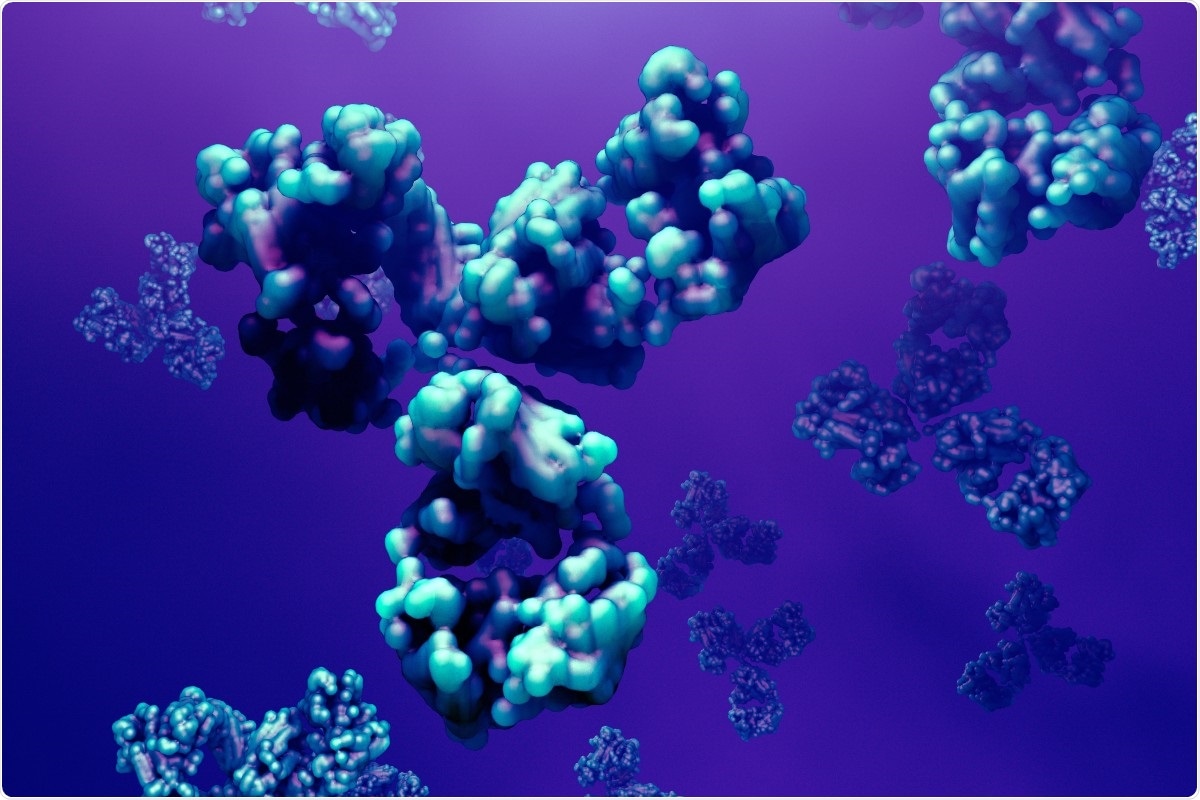Antibodies meant for potential drug applications can be produced quickly in chicken cells cultured in laboratories.

Artist’s illustration of antibody molecules. Image Credit: © Design Cells/Adobe Stock.
Scientists have dubbed their method as human ADLib system, which stands for autonomously diversifying libraries. This method automatically constructs large libraries, or numbers, of different antibodies using the natural method of the cells of the chicken immune system to shuffle their genes.
Antibodies, which are usually shaped like the letter Y, are created by the immune system to fight against infections and prevent re-infection. Small parts of that Y-shaped antibody are extremely variable.
Using their special shape, antibodies create a perfect molecular hug with certain antigens, molecules on the surface of the cause of an infection. Antibodies must detect, bind, and remain adhered to an antigen to effectively eliminate an infection.
Our ADLib system can generate human antibodies against various antigens faster than existing methods.”
Hidetaka Seo, Study First Author and Project Researcher, University of Tokyo
The study was recently published in Cellular & Molecular Immunology—a scientific journal.
In standard methods, individual antibodies are initially detected and then created through a gradual, multistep process involving animal cells and bacteria. At times the antibodies are extracted from the blood of infected or vaccinated animals, and these are later altered for safe use on humans.
A few members of the present research team developed the first ADLib system in 2005. During that time, the members were working at the RIKEN research institute located outside Tokyo.
The original ADLib system-generated chicken antibodies using the cells of the chicken immune system. Since that time, other scientists have produced human antibodies in whole live chickens.
We had the idea for the human ADLib system at that time, but the technology was very difficult to develop.”
Kunihiro Ohta, Study Co-Author and Professor, University of Tokyo
Ohta also headed the original ADLib research team at RIKEN and is now the dean of the Graduate School of Arts and Sciences at the University of Tokyo.
Seo added, “This is the first case of human gene recombination sequences capable of providing practical antibody libraries being developed using avian cells grown in a laboratory.”
The researchers developed the human ADLib system by initially introducing the human genes to substitute the antibody genes of the chicken immune cells as well as the surrounding units of DNA called pseudogenes.
Later, the cells grow in a dish and increase in numbers for several weeks, producing antibody genes of different new combinations.
This haphazard antibody-generator quality of the human ADLib system results in the production of many unwanted antibodies but it may also produce more efficient antibodies than the “built-for-purpose” antibodies that are naturally produced by an animal or human immune system during an infection.
The scientists separately coated small magnetic beads with the target antigens. The chicken cells are finally burst open and the contents are cleaned with the magnetic beads. The antibodies that remain on the antigen-coated magnetic beads are transferred to the antibody library.
After the antibodies are isolated on the magnetic beads, the whole process of detecting them and validating their specificity can be finished within 10 days. According to the researchers, this process is relatively faster than the traditional methods of antibody generation, which can take a few months.
Several variations of antibodies may have the ability to bind an antigen but remaining attached is important for the proper functioning of the immune system.
The human ADLib system comprises a second phase to reinforce the ability of the antibodies to bind and remain attached to their antigens through a process known as binding affinity maturation.
Even though binding affinity maturation is difficult in traditional techniques, the human ADLib system provides a simple and effective technique.
Chicken cells with the required antibodies are cultured in the laboratory for another brief period to further differentiate the antibody genes moderately. Antibodies that have stronger binding affinities to the antigen can be separated from this second library.
The scientists have effectively achieved around a 100-fold improvement of the binding affinity. So far, they have tested the human ADLib approach to identify antibodies that are similar to those being used for treating certain types of cancer.
In the future, antibodies for therapeutics to overcome currently unmet medical needs could be generated by using the human ADLib system.”
Yukoh Nakazaki, Study Co-Author and Head of the Research Labs, Chiome Bioscience Inc.
Chiome Bioscience is enhancing this technology in association with the University of Tokyo.
The human ADLib system is not restricted to producing antibodies.
“If we replace the relevant chicken genes and pseudogenes with any other gene of interest, we could generate libraries of other proteins for agricultural, veterinary, or medical uses,” Seo concluded.
Source:
Journal reference:
Seo, H., et al. (2020) Streamlined human antibody generation and optimization by exploiting designed immunoglobulin loci in a B cell line. Cellular & Molecular Immunology. doi.org/10.1038/s41423-020-0440-9.